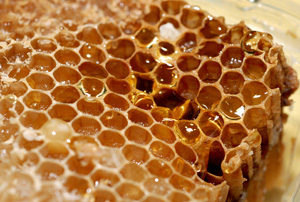 Honey has been used to treat different ailments for thousands of years, but recently raw honey has been getting a lot of attention. It’s being touted for its nutritional benefits, its antibacterial properties and its ability to treat allergies. But are these claims too good to be true?
Honey has been used to treat different ailments for thousands of years, but recently raw honey has been getting a lot of attention. It’s being touted for its nutritional benefits, its antibacterial properties and its ability to treat allergies. But are these claims too good to be true?
Raw honey, which is unprocessed and is as close to its natural state in the hive as possible, is a source of polyphenol, a rich antioxidant that may reduce the risk of cancer and heart disease. According to WebMD, a small study showed that people who ate four tablespoons had higher levels of antioxidants in their blood.
Ancient Egyptians were known to use honey to help heal wounds, and modern science is revealing why this treatment was effective. In addition to honey’s antioxidant content, honey also acts as an antibacterial agent. According to Peter Charles Molan, a honey researcher at the University of Waikato in New Zealand, honey applied to a wound reacts with the body’s fluids and creates hydrogen peroxide. Honey also has a relatively low pH, which may make it an inhospitable environment for bacteria to grow in. The FDA approved a honey-infused bandage called Medihoney in 2024.
What about the claims that raw, local honey can help treat allergies? The evidence for this claim is less convincing. A relatively small study cited by the American Academy of Allergy Asthma & Immunology did not find conclusive data that honey can ameliorate allergies.
Of course, honey has been used to soothe sore throats for centuries, particularly when combined with lemon or ginger. One study from Pennsylvania State University found that honey was about as effective at relieving the severity and frequency of coughing as an over-the-counter cough medicine. Of course, the antioxidant properties of honey may also help fight illness.
It’s important to remember that honey is still a form of sugar, containing about 60 calories per tablespoon. The American Heart Association recommends that men consume no more than nine teaspoons of sugar per day and no more than six teaspoons for women. None the less, the factors listed above seem to make a pretty convincing argument from switching from refined table sugar to raw honey–and keeping some extra around to swab onto small cuts or burns.
Also Read:
